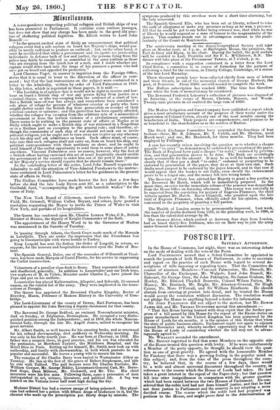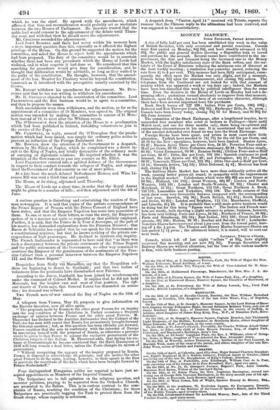POSTSCRIPT.
Lord PALMERSTON moved that a Select Committee be appointed to search the journals of both Houses of Parliament, in order to ascertain and report on the practice of each House with regard to several de- scriptions of bills imposing or repealing taxes. That the Committee do consist of nineteen Members—Viscount Palmerston, Mr. Disraeli, Mr. Chancellor of the Exchequer, Mr. Walpole, Lord John Russell, Mr. Estoourt, Sir George Grey, Sir John Pekington, Sir Jamea Graham, Mr. Henley, Mr. Edward Pleydell Bouverie, Colonel Wilson Patten, Mr. -Massey, Mr. Bentinck, Mr. Bright, Mr. Attorney-General, Sir Hugh Cairns, Mr. More O'Ferrall, and Sir William Heathcote. He should abstain from entering at present into detail, and he trusted the House would accept the resolution without discussion. The resolution would not pledge the House to anything beyond a desire for information.
Sir Joliet PAKnNcTON did not object to the motion, but Mr. EDWTH JAMES did, and Mr. THOMAS Duricomse moved this amendment :-
" That this House having learned with deep regret that the further pro- gress of a bill passed by this House for the repeal of the Excise-duties on paper manufactured in the United Kingdom has been postponed by the House of Lords for six months, it is the opinion of this House that when the state of public business admits, Parliament ought not again to adjourn beyond November next, whereby another opportunity may be afforded to the House of Lords of considering whether the bill may not be advan- tageously agreed to."
Mr. WHALLEY seconded the amendment.
Mr. BRIGHT regretted to find that some Members on the opposite side of the House treated this question with levity. If he were unfortunately a Member of the party opposite, he thought he should view the ques- tion as one of great gravity. He agreed with the honourable Member for Finsbury that there was a growing feeling in the popular mind on this subject ; and, from the tone of the press throughout the coun- try, he believed that, in the course of a few days, there would be a wide and almost universal discontent throughout the country, in reference to the course which the House of Lords had taken. He bad taken a great interest in the repeal of the Paper-duty ; but that question fell into utter insignificance in comparison with the greater question which had been raised between the two Houses of Parliament. He con- sidered that the noble lord had not done himself justice, and that he had not done justice to Parliament and the country in not adopting a more decided course. The course which the noble lord bad proposed was perilous to the House, and might prove fatal to the Administration
which he was the chief. He agreed with the amendment, which affirmed that time and reconsideration would probably act as mediators between the two Houses of Parliament. He therefore trusted that the noble lord would consent to the adjournment of the debate until Thurs- day next, and with that view he should move the adjournment.
Mr. CHILDERS seconded the adjournment. Lord Jogs RUSSELL said there had never within his memory been a more important question than this, especially as it affected the highest privilege of the House. On this ground lw supported the motion for the committee, and asked the House to reject both the amendments which had been proposed. The duty of the committee would be to ascertain whether there had been any precedents which the House of Lords had violated, and in what respects it had done so He considered that this searching for precedents would give time for consideration, and he thought that deliberation would be advisable, so long as they walked in the paths of the constitution. He thought, however, that the amend- ment of the hon. Member for Finsbury went far beyond the oonstitution, inasmuch as it interfered with the prerogative usually exercised by the Crown.
Mr. BRIGHT withdrew his amendment for adjournment. Mr. DUN- COMBS said that he too was willing to withdraw his amendment.
Mr. H. Snratus.tx objected to the constitution of the committee. Lord Pilainnerox said the first business would be to agree to a committee, and then to propose the names. Both amendments were then withdrawn, and the motion, so far as the appointment of a committee of 19 Members, was agreed to. The original motion was amended by making the committee to consist of 21 Mem- bers instead of 19, to meet after the Whitman recess.
The O'Dosroonez drew the attention of the House to a proclamation which had been published in Ireland, forbidding volunteers to join in the service of the Pope.
Mr. CULDWELL, in reply, assured the O'Donoghue that the procla- mation which had been issued, was simply the ordinary police notice to prevent an infraction of the Foreign Enlistment Act. Mr. BOWYER drew the attention of the Government to a despatch, written by Mr. Elliot at Naples, which he complained was a direct in- sult to the King of Naples, and totally destructive of the ordinary mode of carrying on diplomatic relations. He inquired whether it was the intention of the Government to pass any censure on Mr. Elliot. Lord PALMERSTON entered into a spirited defence of the Government in respect to their conduct towards the refugees of Naples, and stigma- tized the Government of that country as one of mere police.
At a late hour the much debated Refreshment Houses, and Wine li- cences Bill was read a third time and passed.
The House, at its rising, adjourned until Thursday.
The House of Lords sat a short time, in order that the Royal Assent might be given to a number of bills ; and then adjourned until the 4th of June.



























 Previous page
Previous page